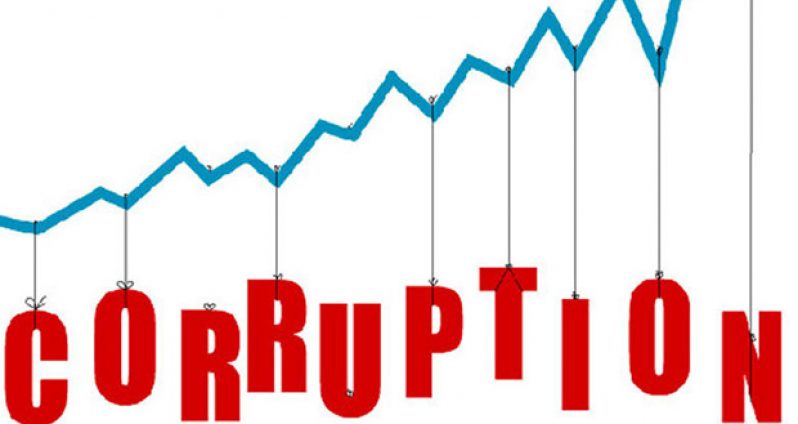– ABC diplomats say index useful for gov’t
By Ariana Gordon
THE Private Sector Commission (PSC) on Friday made it vehemently clear that it is not in agreement with Guyana’s ranking on the International Corruption Perception Index (CPI).

Guyana is ranked 119 on the Index put out by anti-corruption watchdog Transparency International, and garnered a score of 29. Guyana has over the years received a poor rating on the Index.
But the PSC said the findings cannot be viewed as credible, as it speaks to a “perception” and not necessarily the reality on the ground. Member of the PSC, Gerry Gouveia, did not hesitate in making it clear that he personally has a problem with the Index.
“I take great offence to that report and I would say to you that we have never been approached by the people who do those surveys to get our opinions.

“We don’t know where they are getting that opinion and so the Corruption Perceptions Index is one which seems to be lopsided,” remarked Gouveia.
He was at the time speaking at a press conference hosted by the PSC and various diplomatic missions here.
The PSC member made it clear that the private sector should be consulted in the preparation of the Index.
He said, those conducting the survey are doing so in isolation from the varying sections of society.
“It should be compulsory that you engage the private sector,because if there is any corruption taking place then the formal private sector would be in the middle of it.”
Mr Gouveia, however, agrees that there are necessary steps that must be taken in order for Guyana to enjoy a better ranking on the Index, such as the operationalisation of the Procurement Commission and the effective functioning of the Integrity Commission.
“The government could in fact operationalise the Integrity Commission; it has been lingering for the longest while…the Procurement Commission they need to get it done.

“We are very pleased that the Ombudsman is working, but when those institutions are functioning, they allow us to undermine that Perception Index because those bodies will speak their facts.”
Diplomats have disagreed with the position taken by the private sector.
British High Commissioner Gregg Quinn said the report should be of good use to the government as it points to areas where improvements can be made. Quinn acknowledged that the PSC should have been consulted, but said that does not negate the fact that the report is valuable.

“If people feel that there is a corruption problem, then that by itself is an issue that is worthy of being addressed, because that is the fundamental problem…People believe that there is a corruption problem and that is one of the issues which must not be ignored,” the British High Commissioner stated.
The report he said represents the thoughts of the people on what is actually occurring in Guyana.
Deputy Chief of Mission of the U.S. Embassy, Bryan Hunt, said that it is important to examine what the Index is being used for. Hunte said once used correctly, it can be valuable.
“If someone is taking the [Index] and saying ‘because of this rank, Guyana is more corrupt than X country,’ then that would be an incorrect use of that tool.
“But what the tool tells you is how people perceive Guyana and that is important because the way people perceive Guyana, drives investment decisions both from the interior and from the exterior.”
The U.S. envoy stated that it is important for the leaders of any country to know the public’s perception.
“…it is important to know if you are perceived to be corrupt, to know what you need to change whether that is in policy, media engagement, or public education,” Hunt added, while noting that Index gives a good idea of the way people think and view Guyana.
Hunt noted that the Index may give an indication as to why Guyana may be facing a more difficult road than some other countries.
But despite the explanations provided by the diplomats, the PSC member held strong on his view that the report lacks credibility
“It is improper not to consult the private sector…to totally ignore the formal PSC is damaging the image of the country. I have serious problems with the way it is being done,” said Gouveia.
“It should be compulsory that you engage the private sector, because if there is any corruption taking place then the formal private sector would be in the middle of it.”
In response to Gouveia’s displeasure on the issue, Hunt said, “If the ordinary Guyanese is unaware (of what the government is doing) then they will give a different response than exists.” Government he noted, may very well need to up its public awareness campaign to keep citizens informed about what it is doing to address the issue of corruption here.
Charge d’Affaires, Canadian High Commission, Daniel Joly, said that Investments are driven by corruption perceptions and as such he thinks it is important to fight actual corruption and not the perception of corruption.
“I think it is very important that we be seen, and that applies to the private sector, the government and the individuals, not fighting the perception but the actual corruption. That’s why we are supporting Transparency International throughout the world.
“The campaign against corruption…wasn’t popular with the previous government, but it underscores the importance of joining efforts against corruption.”
The Transparency International Corruption Perception Index of 2015 which was released less than two months ago, stated that while governments have spoken about issues of corruption, little has been done to tackle corruption. Countries such as Guyana, the report said, have illustrated little sign of improvements.
Guyana’s score of 29 was a decline from its previous year of 30, but notwithstanding the country did move up in its ranking. In 2014, Guyana was ranked 124 out of 175 countries while last year, it ranked 199 of 168 countries.



.jpg)








